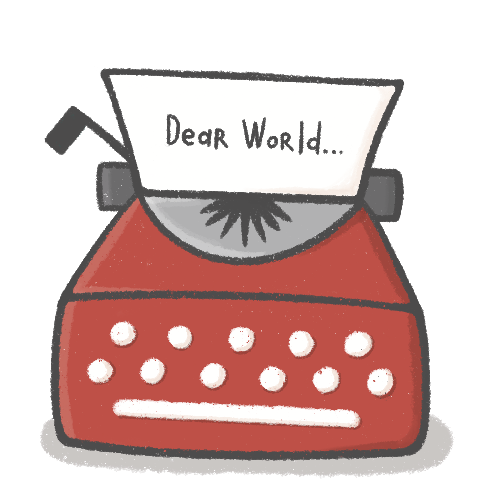It’s that horrible feeling when you sit down to write…
But instead of finding that creative flow pouring out, you sit paralyzed – staring at your computer screen and seething at the impossible task of…words.
Everybody who’s tried communicating with words has felt it: a paralyzing barrier between the idea you want to share & the ability to actually Get. It. Out!
I’ve felt it too. Sometimes I got over it & hammered out the piece I was working on – resistance be damned – & sometimes I was beaten by it.
I’ve sat staring at a blank page in a notebook, an empty blog post screen or a blinking cursor on the white blank page of my University thesis (traumatized) & nothing has come out of me – no matter how hard I stared.
I’ve given up before. I’ve run away from my keyboard in a cold sweat – feeling frustrated & unsatisfied, and I’ve procrastinated on Facebook & Netflix too.
I’ve felt like whatever it is that makes my writing good is just not here for me when I need it, so why bother trying?
I’ve had…(duh duh duhhhhh)…Writers’ Block!
But I want to tell you a secret. That feeling? is NOT actually Writer’s Block, because there is no such thing as Writer’s Block.
The feeling is real – don’t get me wrong – but there is no outside force keeping you from writing your pithy prose or witty words. There is no benevolent muse or inspiration magic that will set you alight with an idea either.
It’s all you, baby – win lose or draw. You are either writing that jazz, or you are not. No ethereal force can be credited or blamed for the results. That’s where the real problems with calling it Writer’s Block show up.
You’re making it about something outside of your self: a mythical, fictional, vague presence that you can blame or praise for your failures or your successes.
That is a major problem, and I’ll tell you why:
1. YOU GIVE UP CONTROL OVER WHAT HAPPENS NEXT.
There’s no way around it. Writing is hard, but if you give up control over the outcome in this way, you can give up on sharing your message FAR too easily. You get to blame that scary, malevolent beast of Writer’s Block and then run away the victim, without any blame. Right?
WRONG!
Here’s the thing: you can’t give up the control & responsibility of driving a car when there’s nobody else ready to grab the wheel. If you stop steering, it’s your fault when the car crashes.
Writer’s Block isn’t sitting there trying to grab the wheel from you, & Inspiration isn’t waiting for the chance to push down on the accelerator.
If you let go of that control, it’s on you.
2. YOU GIVE UP CREDIT WHEN YOU SHOULDN’T.
The other side of this whole thing – & it’s a reeeeeally important one to me – is that we stop taking credit for the work that goes into writing really really powerful stories. By taking it from ourselves when it doesn’t work, we also take it from ourselves when it does.
I used to sit down at the keyboard (or with a notebook & pen) & just wait for it to come pouring out. The problem is that it sometimes did, so I believed that it would work that way again & again…until it didn’t.
That’s when I took myself out of the equation & started using the Writer’s Block & Inspiration excuses.
When I wrote those beautiful poems, or those clever & interesting essays, it was because I was Inspired. When I sat & stared & couldn’t muster up so much as a coherent sentence? All the fault of Writer’s Block!
Except…I wrote those poems! That was me who crafted those essays & stories. Why am I giving credit to a thing that’s not even real, for the work & skill & talent I have been building for all these years?
Because if I give the credit for all my hard work to Inspiration, I get to blame Writer’s Block for the times I don’t want to put the work in! Tidy, huh?
Listen! You are the writer & the creator of your message; your creativity is not at the whim of some mythical outside force. You aren’t a passive conduit for a vague cloud of word-magic.
3. YOU MAKE IT IMPOSSIBLE TO FIX.
This is the biggest biggie of all of my 3 big reasons to can thoughts of Writers’ Block.
If you aren’t honest with yourself about why your writing project is hiding under seven tabs of social media and buzz feed articles, you will never – EVER – be able to fix it & get that piece written.
Seriously! You’re blaming your problem on a fictional thing. Can I blame Work-Out-Block for the extra 10 pounds I should lose? Can I blame the Waking-Up-On-Time-Block for my eleventh Snooze this morning? Nope!
I have to look at why I’m actually not working out (I dislike going to the gym) and then solving that actual problem (go for a walk or run around the lake nearby); I have to look at why I’m actually hitting that snooze button (I stayed up waaaaay too late) & fix that problem (errr…get off the internetz at bedtime).
Otherwise? I’m not really trying to fix the problem; I’m trying to excuse it.
You have all of the tools you need to break through that wall & Design a Writing Process of your own that you can trust – every time you need to create something great.
If Writers’ Block is something that’s been haunting you, there are a few things you can do right now to get rid of it.
- If you haven’t already, you should sign up for the free #30DaysWithaK Free-Writing Challenge. It is the single most effective way to unleash your own Voice over time, & I can’t believe I’m giving it all away for free. So get in there & do it!
- You should read on to learn how a clear & purposeful Writing Process can save you sanity…and time!
Thanks for coming by today! I love hearing from you, so I want to know: what does “Writer’s Block” look like to you?
When does it creep up on you the most, and how do you shake it off?
If you’ve been a reader for a while, we’ve talked about this before (I may even have attached a former comment of yours on the topic), but I want to know: has it changed for you? Why?

Writing Process Cornerstone
Your Writing Process Matters. When a client or student of mine is struggling with any part of their writing, there are five things I examine in order to find the reason behind their difficulties. It’s like a doctor’s screening process, I imagine. The first place I look to help me diagnose and treat their writing…
Don’t Believe Impostor Syndrome; human value isn’t a competition.
Impostor Syndrome can affect anyone. But the experience of women, people of colour, and neurodivergent and disabled people with impostor syndrome should be viewed through an intersectional lens. Impostor Syndrome tends to describe high-achieving individuals who lack an ability to internalize their accomplishments and a persistent fear of being exposed as a fraud. Sound familiar?…
Your Writing Process Matters. Stop the Cage Match!
Okay, so I recognize that you might not imagine the term, “Cage Match” as a descriptor of your writing process. But it will all make sense in a minute. I swear! We all get frozen sometimes when we are writing. A few weeks ago, I talked about how that freezing sensation has nothing to do with Writers’…



